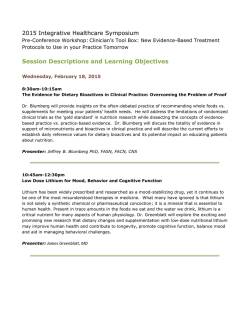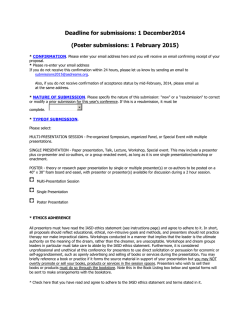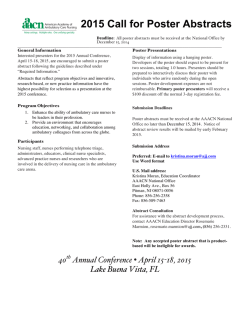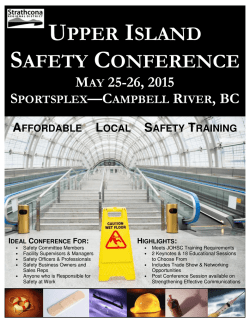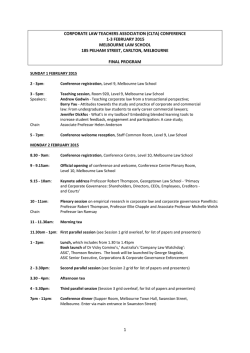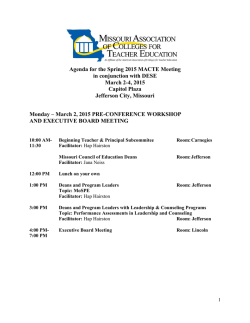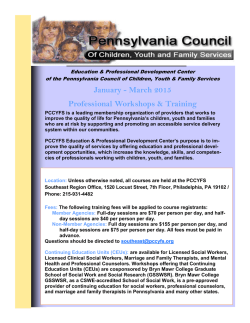
Thursday 60 Minute Concurrent Sessions
Thursday, February 26 A-1 Room 100 A-2 Room 101A A-3 Room 101B A-4 Room 102A A-5 Room 102B 60 minute Concurrent Sessions-A 10:45 a.m. – 11:45 a.m. Transforming Developmental Reading through Information Literacy Presenter(s): Mary Zimmerer, Kim Chuppa-Cornell, Tricia Sindel-Arrington, Chandler-Gilbert Community College, Strands: Active Learning, Literacy/Reading, Course Redesign Contextualized reading curriculum co-developed and co-taught with reading and library faculty is the focus of this presentation. The infusion of library research strategies into a developmental reading course creates an instructional model which combines contextualization, open education resources, and information literacy and prepares students for success with content-area reading and research requirements in college-level courses. Using CAS Learning Assistance Programs Standards for Program Design and Evaluation Presenter(s): Linda Thompson, Harding University, Karen Patty-Graham, Southern Illinois University, Edwardsville (retired) Strands: Professional Development, Assessment, Administration Interested in program assessment and improvement? This session will explore how to use the Learning Assistance Standards published by the Council for the Advancement of Standards in Higher Education (CAS) to identify program strengths and weaknesses, evaluate outcomes, and form action plans to improve program and student success. NADE Certification Voices and Overview Presenter(s): Naomi Ludman, Southwestern Michigan College, Lisa Putnam-Cole, Heartland Community College Strands: Professional Development, Research, Administration Certification Council members and representatives of NADE-Certified programs will provide an overview of the certification process, including continuing certification. Specific topics will include application components, the benefits of certification to programs and their students, pitfalls to avoid, and things certified program staff wish they had known before starting the process. Lifespan Reading Development: A Model for the Future College Reading Program Presenter(s): Victoria Appatova, University of Cincinnati Strands: Literacy/Reading, College Success, Administration This session will help the audience form a vision of a future college reading program based on the theory of lifespan reading development. The presenter will focus on the needs of college level readers, offer a model for the future college reading program, and facilitate a discussion on alternative models. Gateway to College Reading: Bridging the Gap for Developmental Students Presenter(s): Amanda Casey, Three Rivers College; Maret Felzein, Northeastern Junior College; Sherry, Kennedy, Southeast Missouri Educational Consultant Strands: Literacy/Reading, Technology, Course Redesign How does one really prepare students for college academic reading in one to two semesters? This session will focus on how Three Rivers College has adapted the online Reading Plus® program to assist students in developing and increasing stamina, fluency, and overall reading comprehension. This versatile and valuable resource can also be utilized in assisting instructors and pinpointing students’ individual reading needs. A-6 Room 102C A-7 Room 103 The Future of Education: Adaptive Learning in the 21st Century Classroom Presenter(s): Nahel W. Awadallah, Johnston Community College, Beth Hammett, College of the Mainland Strands: Cognitive & Affective Learning, Course Redesign, Technology What is adaptive learning? How does it work, and how can it help students’ succeed? See the research, preview data and reports, and view how it meets accreditation requirements. See two instructors who transformed courses into adaptive learning classes, and understand how it prepares 21st Century students for academic futures. Bridging the Gap Between Learning Support and College Level Courses Presenter(s): Daryl Stephens, Stacy Onks, Michael Briggs, Robert Russell, East Tennessee State University Strands: Course Redesign, Advising, Learning Centers Developmental studies courses at our university have changed so that now students are enrolled in college level, general education courses with extra support. We discuss results of these changes and how this has impacted advising as well as how learning support students in writing, reading, and mathematics are served. A-8 Room 104A A-9 Room 104B A-10 Room 201 Comparison of Three Delivery Approaches: A Mathematical Stepping Stone for Underprepared Students Presenter(s): Torrey M. Burden, Wilson M. Jones, Jr., North Carolina Agricultural and Technical State University Strands: Mathematics, Technology, Course Redesign Comparison of three instructional delivery approaches for teaching developmental intermediate mathematics (MATH 099) at North Carolina A&T State University fall 2012 as it relates to student success and retention today. Approaches include: the traditional (lecture format); the emporium (lecture replaced by computer-based format); and the fully online (internet format) models. Learning: Anytime, Anywhere Presenter(s): Emily Jones, Hawkes Learning Strands: Mathematics, Technology Hawkes Learning provides affordable and accessible materials built and based on the principle of mastery of learning. Come and learn our new tablet-friendly platform that requires no installation or plug-ins. All attendees will be entered to win an iPad Mini! Approaching Students as Others: Ethics in Developmental Education Presenter(s): Hillary Procknow, The University of Texas at Austin Strands: College Success, Course Redesign, Diversity The population of developmental students is notoriously difficult to classify, defying stereotype or uniformity. A number of ethical theorists, however, offer approaches to teaching that resist the tendency to categorize students. The purpose of this session is to provide a theoretical framework for teaching developmental students within an ethical relationship. A-11 Room 202A Extender: A Two/Three Week Program for Course Recovery Presenter(s): Marsha Cardenas, Denise Lujan, The University of Texas at El Paso Strands: College Success, Course Redesign, Mathematics The Extender Program uses the “down-time” between semesters to help students who either did not complete their course or failed their final exam. This allows an opportunity for students who A-12 Room 202B A-13 Room 202C A-14 Room 203 would have failed the ability to successfully pass and move on to their next mathematics course. A Difference SPIN on Tutoring: Structuring the Learning Process Presenter(s): Samantha Crandall, Ozarks Technical Community College, Thea Brophy, Calvin College, Terrance Bradford, Umpqua Community College Strands: Learning Centers NADE’s Tutoring & Peer-Assisted Learning SPIN group is proud to present “A Different SPIN on Tutoring”. This session will focus on effective communication and will include activities on active listening and asking probing questions. Handouts will be provided on how to incorporate these activities in your own tutor training meetings. Teaching Annotation through Group Negotiation Presenter(s): A Danielski, P Gage Strands: Reading, Learning Centers, College Success Participants will try a method for teaching annotation (marking text). This method utilizes small group negotiation to help students find, understand and interact with the important ideas in a complex reading. Participants can use this in their classrooms and share this with content-area instructors to promote reading across the curriculum. Strategies for Creating Effective Integrated Reading and Writing Non-course Competency-based Options (NCBOs) Presenter(s): Leta Deithloff, The University of Texas at Austin Strands: Literacy & Reading, Composition, College Success With the IRW classroom reality looming, institutions are shifting focus from “why” to “how to” integrate. Using varied field experience, the presenter helps align future courses with current goals. Practical questions, techniques, and suggestions guide participants through syllabus construction, reinvigorating the confidence needed to conceptualize—and teach—a blended approach. Thursday, February 26 B-1 Room 100 B-2 Room 101A 60-minute Concurrent Sessions-B 12:00 noon – 1:00 p.m. Riding the Transition Roller Coaster Presenter(s): Pinder Naidu, Tonya Jones, Kennesaw State University Strands: Mathematics, Course Redesign This presentation, “Riding the Transition Roller Coaster,” covers bridging the past, keeping pace with the changes at the state level, and also, reinventing the present choices being offered to our developmental mathematics students as institutional consolidation looms. Come see the possibilities and success stories of our ride into the future. Q&A with the NADE Certification Council Presenter(s): Jen Ferguson, Cazenovia College; Linda Thompson, Harding University; Jane Neuberger, Syracuse University; David Otts, Middle Tennessee State University; Naomi Ludman, Southwestern Michigan College (retired); Karen Patty-Graham, Southern Illinois University-Edwardsville (retired) Strands: Professional Development, Administration, Course Redesign Do you have questions about your application or the certification process in general? Are you B-3 Room 101B B-4 Room 102A interested in learning more about the council or becoming involved in its work? Come, ask questions, and share ideas, especially at this time when many programs are experiencing the challenges of redesign. Co-Teaching the Co-Req: Stories, Successes, and Strategies Presenter(s): Kimberly A, Hilton, Danielle N. Marshall, Ivy Tech Community College Strands: Accelerated Learning, Professional Development, Research, Administration This session will present the personal stories and strategies of faculty who teach composition corequisite courses at a community college. Due to staffing shortages and credentialing, coteaching is often necessary and requires communication, coordination, collaboration and commitment. Student feedback and faculty interviews will provide a blueprint for co-teaching success. Universal Design for Learning: A Bridge to the Future Presenter(s): Robin Ozz, Jeni Ussery, Phoenix College; Roberta Pardo, Mary Zimmerer, Chandler-Gilbert Community College Strands: Professional Development, Cognitive & Affective Learning, Active Learning B-5 Room 102B Universal Design for Learning is a practice that systematically improves learning and instruction for all students along the learning spectrum. Participants will learn how to incorporate UDL into their work while taking part in sample activities that address both the cognitive and affective domains of learning. Math Redesign: Eating the Developmental Math Elephant One Bite at a Time! Presenter(s): Anna Anaya-Vega, Tammy Bishop, Maria Cerra, Wayne Community College Strands: Mathematics, Course Redesign B-6 Room 102C Wayne Community College will present implementation methods for DMA math in seated, combination, online, and repeater courses. Timelines and reenrollment procedures used to meet the four-week modular format will also be discussed. Data will be shared regarding successes in student retention, subsequent courses, and the decrease in student absenteeism. Please join us. Leadership Development Outcomes for Facilitators of Peer Learning Small Groups Presenter(s): David Arendale, University of Minnesota Strands: Learning Centers, Research B-7 Room 103 B-8 Room 104A Facilitating peer study groups is powerful for student leaders to develop leadership skills. This presentation shares findings from a study of peer study leaders at the University of Minnesota. This interactive session provides time to share resources and ideas for being more intentional with this student development outcome. Drive-thru Mathematics: 5 Super-sized, Fun and Cheap Hands-on Classroom Activities Presenter(s): Meredith A. Higgs, Middle Tennessee State University; Daryl Stephens, East Tennessee State University Strands: Mathematics, Active Learning Creating hands-on mathematics activities is often like a drive-thru restaurant: limited time, limited resources, and a need to super-size learning outcomes. This humorous presentation will demonstrate a speedy menu of 5 super-sized fun classroom mathematics activities that are fast and inexpensive. Drive-thru our presentation and choose an activity today! Learning to Teach Integrated Reading and Writing: Evidence from Research and Practice Presenter(s): Susan Bickerstaff, Community College Research Center; Hilda Barrow, Pitt Community College Strands: Course Redesign, Professional Development, Research B-9 Room 104B B-10 Room 201 This presentation will feature findings from research on instructors’ experiences teaching integrated reading and writing courses as well as perspectives from the chairperson of a statewide integrated reading and writing reform committee. Topics include the process of identifying and creating integrated course materials and designing professional development and faculty supports. Developmental Education: Then and Now Presenter(s): Brian Cafarella, Sinclair Community College Strands: Course Redesign, Accelerated Learning, Learning Centers Many people lack an understanding of the discipline’s past and how that past compares and contrasts with the present. In this session, we will explore the rich history of developmental education and how that history compares and contrasts with the present. Moreover, we will discuss a long-term vision for the discipline. An Arithmetic Course Redesign with Proven Positive Results Presenter(s): Barbara Lontz, Montgomery County Community College Strands: College Success, Mathematics, Research Concepts of Numbers for Arithmetic & Prealgebra, a promising innovation, represents a course redesign which has been brought to full scale with significant increases in success rates. Participants will learn the course details, analyze the data and learn about the scaling process that has brought Concepts to other institutions. B-11 Room 202A B-12 Room 202B B-13 Room 202C Tracking the Past to Improve the Future of Student Success Presenter(s): Laura Alvarez, Enginerrica Systems, Inc. Strands: Assessment Engineerica Systems, Inc., creator of AccuTrack, presents how to implement cutting edge, automated center management software in order to prove the positive impact your program has on your students’ success. Create a welcoming atmosphere in your program which will increase the likelihood of repeat visits while streamline the management of student traffic. A Different SPIN on Tutoring: Methods of Tutor Training Presenter(s): Samantha Crandall, Ozarks Technical Community College; Thea Brophy, Calvin College; Elgrie Hurd, Parker University Strands: Learning Centers NADE’s Tutoring & Peer-Assisted Learning SPIN group is proud to present “A Different SPIN on Tutoring.” This session will focus on methods of tutor training including involving tutors as trainers and alternatives to in-person training. Handouts will be provided on how to incorporate these ideas in your own training meetings. Building an Online Bridge to Accelerate Developmental English and Reading: An Instructional Design Perspective Presenter(s): Peter Lindstrom, Colorado Community College System Strands: Composition, Course Redesign, Accelerated Learning Often seen as inappropriate for developmental students who have historically needed more individualized and targeted instruction, online instruction can actually accelerate students through the sequence of developmental courses as they prepare for the rigors of college coursework. This session will show participants effective strategies for developing online content B-14 Room 203 for either web-enhanced or hybrid course delivery methods. Strengthening Academic Writing for Developmental Students Presenter(s): Julie R. Bodnar, Susan L. Petrucelli, American International College Strands: Composition, College Success, Learning Centers The facilitators will share the philosophy, pedagogy, and experience of freshman developmental education and the writing center, exploring high-impact educational practices that support academic success. Building behaviors that promote metacognitive skill development and academic self-efficacy will be emphasized using data gathered over a five-year longitudinal study. Thursday, February 26 60-minute Concurrent Sessions-C C-1 Flipping the 21st Century Classroom Room 100 Presenter(s): Kina Lara, San Jacinto College South Strands: Technology, Active Learning C-2 Room 101A 2:00 p.m. – 3:00 p.m. Have you ever felt as though you don’t have enough time in class to cover everything you’d like to? Well, flipping your classroom may be the solution for you! In this presentation, attendees will learn the basics of the flipped method, different types of technology available, and best practices for implementing the flipped model. The Forward and “Backwards” Design of a Mathematics Co-Requisite Presenter(s): Donna Krampe, Barbara Kirkwood, Ivy Tech Community College-Southwest Strands: Mathematics, Course Redesign, Accelerated Learning The process used to develop a co-requisite math course that provided just-in-time remediation for developmental students who were co-enrolled in a college-level course will be presented. Course delivery, which included mini-lectures, group activities and support of college-level content, will be described and demonstrated. Student survey results will be discussed. C-3 Room 101B C-4 Room 102A Leadership Informed by Scholarship for Transformational Programs Presenter(s): Rebecca Goosen, San Jacinto College Strands: Program Development Transformational change does not happen by chance or in a vacuum. This presentation, by a new CLADEA Fellow, explores how to lead transformational change using a scholarly approach. Examining the evolution of a program, its present state and creating logical, implemental changes based on that scholarly examination will be discussed. Disciplinary Literacy Strategies in DE Courses: Teaching for Transfer Presenter(s): Jodi P. Holschuh, Texas State University; Sherrie L. Nist-Olejnik, University of Georgia; Jodi L. Lampi, Northern Illinois University Strands: Course Redesign, Literacy/Reading, College Success This session will demonstrate disciplinary literacy strategies for developmental literacy. Participants will learn approaches for teaching students about selecting important information, learning vocabulary, and evaluating claims and evidence. Participants will receive sample texts, view strategy examples, practice using the strategies across several disciplines, and discuss classroom use. C-5 Room 102B C-6 Room 102C Restorative Justice Circles: A Proactive Tool for Engagement, Classroom Management, and Learning Presenter(s): Theresa Carlton, Ashley Andrews, John Bragelman, Maria Ortiz, Harold Washington College Strands: Professional Development, Course Redesign Through active engagement in Circle practices, participants will learn about incorporating Restorative Justice Circles in developmental education classrooms. Participants will experience the Community-Building Circle for introductions, building relationships and establishing classroom values; the Fishbowl Circle for engaging all students in whole-class discussion; and the Wheelhouse Circle for one-on-one collaboration. Bridging the Gap between Theory and Practice: The Maricopa Summer Institute Presenter(s): Russ Hodges, Texas State University; Robin Ozz, Phoenix College Strands: Professional Development, Administration Bridge the gap between theory and practice through a professional development you do not want to miss. Participants will learn how to structure a professional development experience while taking part in sample activities that address both the cognitive and affective domains of learning they can incorporate in their work immediately. C-7 Room 103 C-8 Room 104A C-9 Room 104B “Without Contraries is no Progression”: Literacy Instruction and Assessment in New Contexts Presenter(s): Christian M. Bednar, Kathy Yanchous, Jeremy Branstad, North Shore Community College Strands: Assessment, Literacy/Reading, Composition, Course Redesign This presentation will explore the intersection of literacy assessment and instruction within the micro-context of our own open-access institution and the broader theoretical work that helped reshape our everyday departmental practices. We will offer participants a flexible model for powerful programmatic change—informed by the past, responsive to the present. I Have an App for That! Presenter(s): Elena Byrd, Theresa Nystrom, Thomas Nelson Community College Strands: Technology, Mathematics, Learning Centers Instructors must communicate with students to respond to content questions. This session will introduce and demonstrate several mobile (iPad/iPhone) apps that can make it possible to efficiently and effectively communicate with students without the use of a computer. Many apps are geared toward math content but some have general appeal. A Student’s Future: Using Technology to Move Students out of the Past Presenter(s): Robin Muckenfuss, College of the Mainland; Beth Hammett, Durham Technical Community College Strands: Course Redesign, Composition/Writing Can 21st-Century Learners write? Can instructors meet the needs of struggling students in this 21st century? Two instructors teaching integrated reading and writing courses made some changes in their classrooms with the help of technology. The changes included rubrics, adaptive technology, and consideration of the emotional aspects of writing. C-10 Room 201 Sustaining Student Success over a Decade: An Award Winning Model Presenter(s): Paul Fowler, Louisiana State University, Eunice Strands: College Success, Assessment C-11 Room 202A LSU Eunice’s nationally award winning Pathways to Success Program has increased student learning and success during the past decade for students who need developmental coursework in every subject. Discussion will center on the methodology, assessment methods, student reaction, implications for practice, and limitations. Five Tips for Fast-Tracking College Readiness Presenter(s): Rich Turner, Florida State College at Jacksonville; Sande House, Georgia Perimeter College Strands: Accelerated Learning, Course Redesign, Learning Centers Attend this session to hear from university leaders as they share best practices for fasttracking college readiness. Learn how institutions like yours have cracked the code on accelerating college readiness with the right combination of online, self-paced learning, and ongoing support from tutors and mentors. C-12 Room 202B C-13 Room 202C C-14 Room 203 A Different SPIN on Tutoring: Effective Communication Presenter(s): Samantha Crandall, Jacob Llewelyn, Shelby Vicat, Ozarks Technical Community College Strands: Learning Centers NADE’s Tutoring & Peer-Assisted Learning SPIN group is proud to present “A Different SPIN on Tutoring.” This session will focus on effective communication and will include activities on active listening and asking probing questions. Handouts will be provided on how to incorporate these activities in your own tutor training meetings. The T.E.A.M. Approach: BIG IMPACT with Structured Strategies Presenter(s): Mary E. Clark, Belmont University Strands: College Success, Learning Centers The T.E.A.M. (Tutoring and Engaging through Academic Monitoring/Mentoring) Approach has been developed to connect the past, present and future via structured tutoring and academic monitoring through current technologies to effectively support students of the 21st Century. “Redesign: Where Are We and Where Are We Going?” Presenter(s): Jen Ferguson, Cazenovia College; Linda Thompson, Harding University; Jane Neuberger, Syracuse University; David Otts, Middle Tennessee State University; Naomi Ludman, Southwestern Michigan College (retired); Karen Patty-Graham, Southern Illinois University-Edwardsville (retired) Strands: Certification, Board Strand This session will explore, generally, the factors that have led up to the redesign movement, what is happening around the country in the field of developmental education and learning support, and practices that appear to be promising, as well as pitfalls to avoid in designing or redesigning a program of learning support. Thursday, February 26 60-minute Concurrent Sessions-D 3:30 p.m. – 4:30 p.m. D-1 Success Strategies: Accelerating Academic Progress by Addressing the Affective Domain Room 100 Presenter(s): Adam Kempler, College of the Canyons Strands: Accelerated Learning, College Success, Learning Centers D-2 Room 101A D-3 Room 101B D-4 Room 102A D-5 Room 102B D-6 Room 102C Participants will learn in an active environment how engaging students in success strategies that address the affective domain promote success and retention. Participants will explore the affective domain, how it influences success and retention, and what can be done to address the affective domain in the classroom. Assessment in an Integrated Reading and Writing Course Presenter(s): Patti Eney, Kelly Black, Katie Ettlinger, College of Lake County Strands: Accelerated Learning, Assessment, Course Redesign The assessment of integrated reading and writing courses must include both formative and summative elements that assess both reading and writing, but what type of elements really work? This colloquium will include ideas of both types of assessment that have been modified and tested to be successful in our college. Coaching Students on Financial Awareness for Sound Decisions Presenter(s): Maureen Breeze, LifeBound Strands: Advising, College Success, Learning Centers In this session, you will see how academic coaching can be used to help students make sound financial decisions that positively affect their education. Through role-plays, you will witness how coaching inspires students to reflect, weigh costs vs. benefits, and make commitments for academic success, financial health, and well-being. Bridges and Barricades: Student-Perceived Interferences to Success in DE Mathematics Presenter(s): Taylor Acee, William J. Barry, Jodi P. Holschuh, Cristella R. Diaz, Keylan Morgan, Darolyn A. Flaggs, Texas State University Strands: Mathematics, Research This session presents results of a study asking students in DE mathematics to list interferences to their success. Perceiving more interferences that were nonacademic related to lower GPAs, course success, and persistence in college., we will discuss a framework for categorizing student-perceived interferences along with implications for practice. Accelerated Remediation = Accelerated Success Presenter(s): Jim Sigman, Pearson Strands: Accelerated Learning, Course Redesign, Learning Centers Attend this session to learn about a new accelerated readiness and remediation framework that provides students with personalized content form online learning programs, integrated faculty/staff support, online tutoring, and assigned personal mentors to improve and accelerate student success in developmental education. This session will discuss one institution’s experience and results and provide open dialogue on best practices and lessons learned. Building Connections for First-Year Success through a Summer Bridge Program in Mathematics Presenter(s): Donald Anderson, Martin Stensing, Northwest College Strands: Mathematics, College Success This program will share success stories from a two-week community college residential Summer Bridge Program in Mathematics. Pre- and post-test results in mathematics placement, D-7 Room 103 D-8 Room 104A D-9 Room 104B D-10 Room 201 D-11 Room 202A D-12 Room 202B learning styles, study strategies, and motivations will be shared as well as comparisons of overall success rates of participants to non-participants in their subsequent semester. Teaching Sentence Skills in the Context of Reading and Writing Presenter(s): Marian Anders, Alamance Community College Strands: Literacy/Reading, Composition This fun, interactive workshop will present an effective, time-saving method for weaving essential sentence skills into reading and writing instruction. Strategies for teaching students to identify and correct sentence fragments can be adapted for teaching many other topics of grammar and punctuation. How Developmental Students’ Portfolios Can Increase Retention and Completion Rates Presenter(s): Pamela Bandyopadhyay, Joseph Caniglia, Elizabeth Nesius, Hudson County Community College Strands: Course Redesign, Learning Centers, Administration Student portfolios provide a resource for both students and faculty to evaluate the achievement of a student’s performance throughout the semester. This workshop will provide participants the opportunity to view student portfolios, learn about the portfolio process, and obtain an overview of how these student portfolios have aided in the success and retention of Hudson County Community College developmental students. Master of One: The Future of Peer Mentorship and Student Self-Identity Presenter(s): Holly Clay-Buck, Rogers State University Strands: Learning Centers, College Success, Active Learning In the past, peer mentorship has relied on finding students who were “Jacks of all Trades” mentoring weaker students. This presentation, however, will argue that using an individual skills-based peer mentorship system that pairs every student as both a mentor and mentee increases positive academic self-identity and reinforces learned skills. It Takes a Village: How Faculty Tutors Can Enhance Student Success in Writing Centers Presenter(s): Dominic Beggan, Lana Myers, Lone Star College, Montgomery Strands: Literacy/Reading, Composition, Learning Centers The ultimate goal of any learning center is to foster student participation, faculty buy-in, and administrative support for programs contributing to student success. This workshop provides a brief, historical context for the college’s program; discusses best practices for faculty tutors; and offers suggestions for institutions who wish to enhance their learning centers. Leadership Through Service: The Speaker’s Bureau Presenter(s): Karen Kalivoda, Molli Scarborough, University of Georgia Strands: Service Learning, Disabilities, Diversity This presentation will introduce the Speaker’s Bureau, which promotes leadership skills using disability advocacy as a framework, with a focus on service learning, diversity, and empowering students as part of a holistic education. Participant videos will be shown as examples, followed by discussion of implementation of similar programs. Accelerated Learning Program in Mathematics: Co-requisite Model with Supplemental Instruction Presenter(s): Constance Calandrino, Hudson County Community College Strands: Accelerated Learning, Course Redesign, Learning Centers D-13 Room 202C D-14 Room 203 In this presentation, participants will learn about a co-requisite program in mathematics which includes a weekly mandatory supplemental instruction session which offers just-in-time teaching. Participants will learn about the design of the program and the curriculum as well as the challenges, benefits and results. The Discussion: Gifted Hands by Dr. Ben Carson Presenter(s): Tammy Donaldson, Del Mar College; Linda H. Miniger HACC, Central Pennsylvania's Community College Strands: Literacy/Reading, Professional Development Come join the Reading and Writing SPIN to discuss the book read for the conference, Gifted Hands. The Role of Non-Remedial Coursework in the Future of Developmental Education Presenter(s): Carrie Coward Bucher, Baker University Strands: Course Redesign, Accelerated Learning This presentation will offer specific, actionable resources for summer bridge programs based on data that demonstrates that an emphasis on learning communities, peer mentoring, nonremedial coursework and intrusive advising are more effective for collegiate success than developmental and college knowledge coursework alone.
© Copyright 2026
